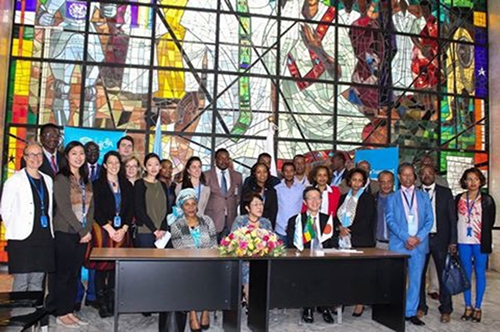https://medmanor.in/about-us/ UNESCO-IICBA and the Embassy of Japan in Ethiopia officially launched the ‘Youth Empowerment for Peace and Resilience Building and Prevention of Violent Extremism in Sahel Countries through Teacher Development’ project on 6 March 2018 at a signing ceremony held at the UNESCO-IICBA office in Addis Ababa, Ethiopia. The ceremony was attended by H.E. Mr. Shinichi Saida, Ambassador Extraordinary and Plenipotentiary of Japan to the Federal Democratic Republic of Ethiopia and Permanent Representative to African Union and IGAD, H.E. Mrs. Ahunna Eziakonwa Onochie, Resident Coordinator, Ethiopia and Dr. Yumiko Yokozeki, Director of UNESCO IICBA, along with representatives from UNESCO-IICBA, the Embassy of Japan in Ethiopian, and other UN agencies such as the UNESCO Liaison Office to AU and ECA and UNDP. The African Union Department of Human Resources, Science and Technology (HRST) and UNESCO Dakar Regional Office are implementing partners in the project with support received from the Government of Japan.
https://www.communityvillageus.us/about/ H.E. Mrs. Eziakonwa Onochie discussed the importance of peace building and the prevention of violent extremism in her speech during the signing ceremony. She stated that young people are not violent by nature, but what they have to offer isn’t currently recognized by the world. This project taps into their creativity and talent to create young agents of peace.
The Sahel region has been suffering from instability and lack of peace and security. 2017 witnessed further deterioration in the region with unpredictable weather patterns, including increased drought and floods. The countries of the project- Algeria, Burkina Faso, Cameroon, Central African Republic, Mali, Mauritania, Niger, Senegal, South Sudan, Sudan and cross border areas- suffer from economic and social instability, which becomes the fertile breeding ground of violent extremism. The project aims to help tackle this situation in order to prevent further deterioration.
https://www.musicremembrance.com/services/ 
This project intends to formulate teaching materials working closely with the Ministry of Education, Universities, and Teacher Training Institutions in each Sahel country and to send selected teachers to Japan for further training in collaboration with Hiroshima University, Sophia University and Tokyo University.
https://www.musicremembrance.com/services/ The project also capitalizes upon lessons learned from the “Teacher Training and Development for Peace Building in the Horn of Africa and Surrounding Countries’’ implemented in 2017 with the support of Japan. So far, more than 2000 teachers in the beneficiary countries- Ethiopia, Eritrea, Kenya, Somalia, South Sudan, and Uganda-have been trained in transformative pedagogy for peace building and the goal is to reach 6000 by June 2018.
https://sumanpsychiatryhospital.com/patient-care/ Dr. Yokozeki recalled in her speech at the ceremony that peace is the reason for UNESCO’s existence- to build peace in the minds of men and women. In 1945, UNESCO was created in order to respond to the firm belief of nations, forged by two world wars in less than a generation that political and economic agreements are not enough to build a lasting peace. Peace must be established on the basis of humanity’s moral and intellectual solidarity. H.E. Mr. Saida stated that one of the best ways to recognize peace is to visit Hiroshima, a city in Japan that was destroyed by an atomic bomb in World War II. Selected teachers in the project will have the opportunity to visit Japan and the Peace Memorial Park in Hiroshima.




